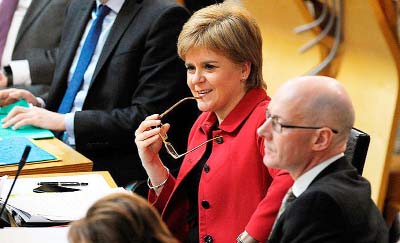
AFP, Edinburgh :
The Scottish government on Friday formally asked British Prime Minister Theresa May for a second referendum on independence, deepening a constitutional crisis sparked by the Brexit vote.
First Minister Nicola Sturgeon wrote a letter to May telling her that Scotland did not want to leave Europe’s single market, two days after Britain launched the process of leaving the European Union.
“The people of Scotland must have the right to choose our own future,” Sturgeon, leader of the ruling Scottish National Party, said in the letter.
Scotland voted to remain in the EU in last year’s referendum but Britain as a whole voted to leave.
Sturgeon argues that this means the circumstances have changed since a 2014 independence referendum in which 55 per cent voted to stay part of Britain.
She said the government had rejected “all attempts at compromise” on Brexit – a reference to her proposal for Scotland to be allowed to stay in the European single market even as the rest of Britain leaves.
“There appears to be no rational reason for you to stand in the way of the will of the Scottish parliament and I hope you will not do so,” she said.
The Scottish Parliament voted by 69 votes to 59 on Tuesday for another referendum, but it cannot hold a legally-binding vote without London’s approval.
Sturgeon has said she wants the referendum to be held by early 2019, before Britain leaves the EU.
However a government spokeswoman has reiterated May’s position that “now is not the time” for a second independence referendum, adding that the government “will not be entering into negotiations on the Scottish government’s proposal”.
“At this point, all our focus should be on our negotiations with the European Union, making sure we get the right deal for the whole of the UK,” she added.
But Sturgeon said that the new referendum would give Scots “the choice of following the UK out of the EU and single market on the terms you negotiate, or becoming an independent country”.
May now faces a battle on two fronts as she seeks to negotiate a good deal from Brexit and tame nationalist sentiment in Scotland.
Opinion polls show support for independence is broadly unchanged from 2014, but May’s firm stance against discussing a vote now is widely regarded as a gamble as Scots could react unfavourably to London ignoring the will of the Edinburgh parliament.
The Scottish government on Friday formally asked British Prime Minister Theresa May for a second referendum on independence, deepening a constitutional crisis sparked by the Brexit vote.
First Minister Nicola Sturgeon wrote a letter to May telling her that Scotland did not want to leave Europe’s single market, two days after Britain launched the process of leaving the European Union.
“The people of Scotland must have the right to choose our own future,” Sturgeon, leader of the ruling Scottish National Party, said in the letter.
Scotland voted to remain in the EU in last year’s referendum but Britain as a whole voted to leave.
Sturgeon argues that this means the circumstances have changed since a 2014 independence referendum in which 55 per cent voted to stay part of Britain.
She said the government had rejected “all attempts at compromise” on Brexit – a reference to her proposal for Scotland to be allowed to stay in the European single market even as the rest of Britain leaves.
“There appears to be no rational reason for you to stand in the way of the will of the Scottish parliament and I hope you will not do so,” she said.
The Scottish Parliament voted by 69 votes to 59 on Tuesday for another referendum, but it cannot hold a legally-binding vote without London’s approval.
Sturgeon has said she wants the referendum to be held by early 2019, before Britain leaves the EU.
However a government spokeswoman has reiterated May’s position that “now is not the time” for a second independence referendum, adding that the government “will not be entering into negotiations on the Scottish government’s proposal”.
“At this point, all our focus should be on our negotiations with the European Union, making sure we get the right deal for the whole of the UK,” she added.
But Sturgeon said that the new referendum would give Scots “the choice of following the UK out of the EU and single market on the terms you negotiate, or becoming an independent country”.
May now faces a battle on two fronts as she seeks to negotiate a good deal from Brexit and tame nationalist sentiment in Scotland.
Opinion polls show support for independence is broadly unchanged from 2014, but May’s firm stance against discussing a vote now is widely regarded as a gamble as Scots could react unfavourably to London ignoring the will of the Edinburgh parliament.

